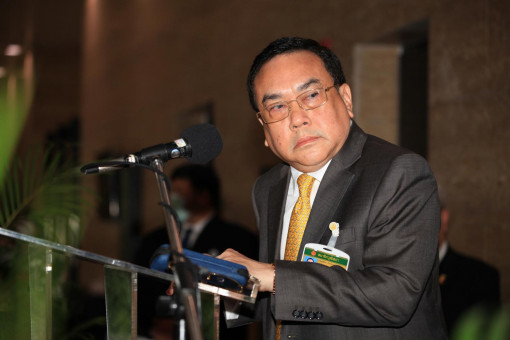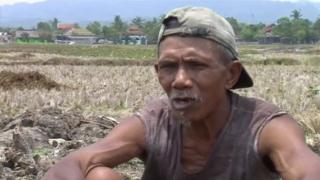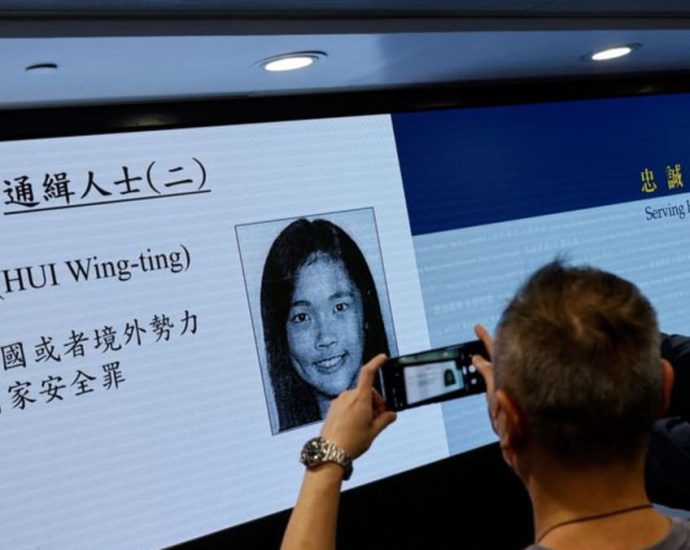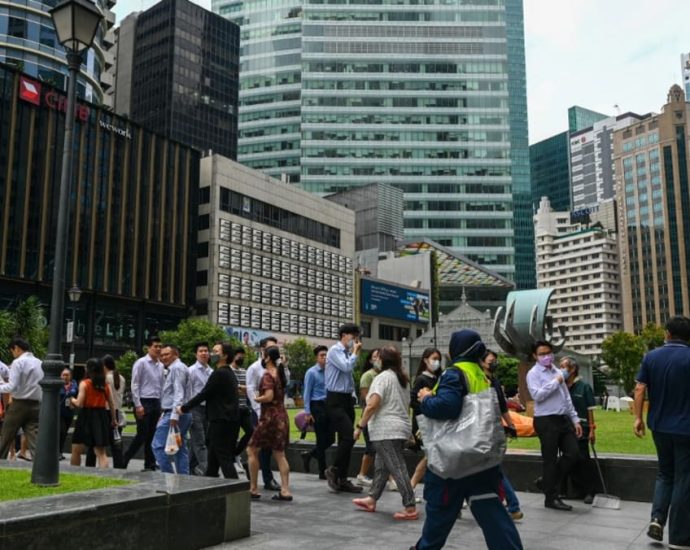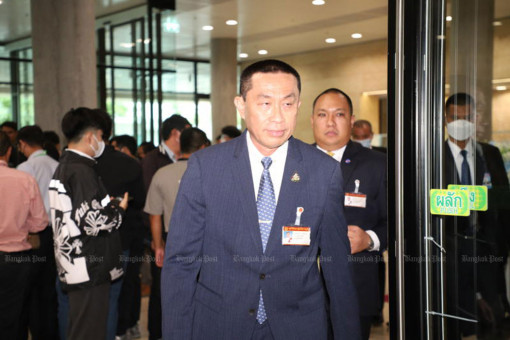30 provinces remain mired in PM2.5
159 hotspots linked to surge in fine dust

Thirty provinces, including Bangkok, remained gripped by high levels of fine particulate matter smaller than 2.5 microns (PM2.5) yesterday as fine dust pollution intensified in many areas of the country.
According to the Geo-Informatics and Space Technology Development Agency (Gistda), the satellite-based Check Foon (dust check) air quality app showed the dust level in Samut Songkhram peaked at 84.1 microgrammes per cubic metre (µg/m³) at 8am yesterday, which surpassed the safe threshold of 50µg/m³.
Yesterday, Samut Songkhram was the only province which reached a “code red”, signifying potentially harmful air, while dust levels in most other haze-affected provinces were designated orange or unhealthy.
In Bangkok, 42 districts were in the orange category yesterday. The highest levels of fine dust were reported in Phra Khanong, Don Muang, Laksi, Bangkok Yai and Bang Na districts.
The app, which is updated hourly, also forecasted that dust volumes in many areas were set to rise from orange to red in a matter of hours based on the PM2.5 data compiled by the Pollution Control Department (PCD) and the Meteorological Department.
As of Wednesday, the Gistda data showed that 159 hotspots, blamed for a surge in fine dust, were detected across the country.
Of them, 96 occurred in agricultural areas, 19 in communities and other areas, 26 in Sor Por Kor agricultural land areas, 13 in national forest parks, four along highways and one in a forest reserve.
Most hotspots were detected in Kalasin (13), followed by Roi Et (12) and Saraburi (11).
Chaiwat Chuntirapong, director-general of the Disaster Prevention and Mitigation Department, said the air quality data collected by the PCD showed that fine dust pollution will remain concentrated in Bangkok and the surrounding provinces until Sunday due to the influence of a cold mass from the North and lack of rain.
Meanwhile, the Bangkok Metropolitan Administration (BMA) will launch a pilot project to plant trees along the busy Ratchadaphisek Road, where traffic clogs up during most hours of the day, in a bid to spruce up its landscape and reduce the fine dust problem.
Chatree Wattanakhajorn, the deputy city clerk, chaired a meeting yesterday to discuss ways of improving the landscape along Ratchadaphisek Road. In attendance were representatives from agencies including the BMA’s Environment Department.
He said the meeting looked into what trees are best suited to help filter dust along the road and outlined traffic management design and operations with the safety and care of pedestrians in mind.
The agencies concerned will work with King Mongkut’s University of Technology Thonburi to scout suitable trees for planting along the road. The plan will initially be carried out from the Rama IX Intersection to Wong Sawang Intersection in Din Daeng, Huai Khwang, Chatuchak and Bang Sue districts.
If it proves a success, it will be expanded to other roads in the city, Mr Chatree said.
Police bust e-cigarette network

PUBLISHED : 15 Dec 2023 at 04:00
Police have arrested the leader of a major e-cigarette distribution network, following raids on two locations in Bangkok yesterday.
Consumer Protection Police Division (CPPD) launched the crackdown after receiving information about “Iqos Thailand FanClub”, a Facebook group used by the network to market and sell e-cigarette modules and cartridges online.
Authorities raided a condominium in Bang Kho Laem district and a house on Nawamin Soi 42 in Bueng Kum district after learning both locations were being used as a e-cigarette storage and distribution centre, said CPPD commander, Maj Gen Withaya Sriprasertsap.
Officials seized over 70,000 e-cigarettes modules and cartridges, worth an estimated 10 million baht.
They also arrested Jenkij Hom-aroon, 32, whom they believe was the network’s leader.
He was taken to CPPD Sub-Division 1’s office, where he was charged with distributing e-cigarettes and cartridges, which are considered illegal in the kingdom.
Meanwhile, Dr Thossaporn Sereerak, Pheu Thai MP for Phrae, on Wednesday told parliament e-cigarettes are becoming more prevalent in the market, saying they are more accessible than ever to those under the age of 20.
“Even primary school students have been found to use e-cigarettes. I have received many complaints from parents who are concerned about how easy it is to purchase e-cigarettes online and why our officers aren’t doing anything to deal with the matter,” said Dr Thossaporn.
Dr Thossaporn urged the parliament to designate the parliament as an e-cigarette-free zone after seeing some ministers and MPs vaping. They should be role models for all people to abide by, he said.
Nicotine is addictive and poses a danger to the development of children’s brains, he said.
On the contrary, Maris Karanyawat, a representative of the popular Facebook group End Cigarette Smoke Thailand, said e-cigarette bans in other countries have yielded similar results.
Countries like the United Kingdom and the United States choose to legalise e-cigarettes, which allow them to better control the distribution of e-cigarettes and collect taxes.
Such measures are a better way to prevent minors from accessing e-cigarettes, he said.
Upakit faces narcotics, money laundering raps
PUBLISHED : 15 Dec 2023 at 04:00

Public prosecutors yesterday filed a suit with the Criminal Court against Senator Upakit Pachariyangkun, accusing him of colluding in money laundering and assisting a transnational criminal organisation.
The suit was filed after the Office of the Attorney-General (OAG) resolved to indict Mr Upakit on charges of money laundering, involvement in a transnational criminal organisation, and supporting or colluding in an illicit drug network.
The senator was accused of having ties with Myanmar national Tun Min Latt, who was arrested for drug trafficking and money laundering on Sept 17 last year.
Sen Upakit, accompanied by his lawyer, arrived at the Criminal Court yesterday. He denied all of the charges.
Prayut Phetkhun, a spokesman for the OAG, said prosecutors had filed the suit against Sen Upakit for six offences, including colluding in illicit drugs, illegal possession of drugs in category 2 (ketamine), money laundering, involvement in a transnational crime organisation, and related offences.
The court accepted the case and scheduled May 13 for the examination of evidence, said Mr Prayut.
On March 17, the 61-year-old senator held a press conference to counter allegations made by Move Forward Party MP Rangsiman Rome that linked him to the Myanmar drug suspect.
He denied laundering money from the drug trade through an electricity supply business operating on the Thai-Myanmar border.
The OAG set up an investigation team, headed by senior public prosecutor Watcharin Phanurat, to look into Mr Upakit’s case. The panel submitted its findings to the prosecutors in charge of narcotics cases, who forwarded their report to the OAG, leading to the decision to indict the senator.
Last month, the Office of the Narcotics Control Board (ONCB) confiscated the assets of Sen Upakit worth 285 million baht in connection with his alleged involvement in a drugs ring and money laundering.
On Nov 30, the ONCB seized more assets worth 476.6 million baht.
Huawei 5nm chip again: breakthrough or inventory?
The use of Huawei Technologies’s Kirin 5-nanometer chip in a new laptop has triggered a new round of online debate about whether the US-sanctioned firm has achieved new technological breakthroughs or just used some inventory made in Taiwan.
A similar debate was seen when Huawei unveiled the Kirin 9000s chip, a 7nm chip used in its Mate60 Pro phone, in late August. Technology experts later found that the processor was made by the Semiconductor Manufacturing International Corp (SMIC) with its N+2 process via deep ultraviolet (DUV) lithography.
The newly-launched Qingyun L540 laptop uses a Kirin chip called 9006C, according to Huawei’s website. The chipset has an octa-core ARM central processing unit, including four A77 and four A55 cores with a maximum clock speed of 3.13GHz.
It’s unclear whether this processor was made in China or it is simply a modified Kirin 9000 chip made by the Taiwan Semiconductor Manufacturing Co (TSMC) three years ago.
But in any case, Washington is going to strengthen its curbs against Huawei’s chip-making plan.
On Monday, Commerce Secretary Gina Raimondo told Bloomberg News in an interview that the US will take the “strongest action possible” in response to Huawei’s launch of the Kirin 9000s chip.
Raimondo said the Commerce Department is deeply concerned by the launch of the Kirin 9000s chip and has been vigorously investigating into it.
She said the US is also looking into the specifics of three new artificial intelligence (AI) accelerator chips that Nvidia Corp is developing for China.
On Wednesday, Thea Kendler, an assistant secretary of commerce for export administration at the Bureau of Industry and Security (BIS), told a House Foreign Affairs Committee oversight panel that the Biden administration shares the lawmakers’ concerns about Huawei’s technological capacities.
However, Kendler said the United States’ export controls are meaningful in slowing China’s advanced technology acquisition. She said the Kirin 9000s’ production scale and performance cannot meet the market demand.
“Neither the performance nor yields may match the market of the device,” Kendler said. “Moreover, the semiconductor chip that is inside that phone is a poorer performance than what they had years ago.”

L420 laptop
Before TSMC was banned by the US from making Kirin chips in mid-September 2020, it had produced the Kirin 9000 chips for Huawei. Some of these chips were made into the Kirin 9000E for use in Huawei’s Mate40 in 2020.
Some Chinese media said TSMC could have shipped about 30 million units of the Kirin 9000 chips in its last shipment to mainland China.
In late 2021, some of these chips were made into the 9006C chips and used in Huawei’s L420 laptops. Most analysts believed that Huawei had already run out of its Kirin 9000 chips over the past two years, given that the Mate50 smartphone launched in September 2022 did not use any Kirin 9000E chip.
Anton Shilov, a writer at Tom’s Hardware, says SMIC may have broken the 5nm process barrier by successfully making the Kirin 9006C chips with its N+2 process.
He says it does not make a lot of sense for Huawei to have kept a large quantity of premium processors for three years. He says the Kirin 9000 has a built-in 5G modem and can be used to make a high-end smartphone rather than an inexpensive laptop.
Some netizens believe that the 9006C chip is only inventory.
A netizen called “Teortaxes” says in a social media post that, even if Huawei can make 5nm chips, it does not necessarily need to replicate a chip identical to the old Kirin 9000E as such a move is not economical.
Until now, Huawei has not yet commented on when and where its Kirin 9006C chips were manufactured.
N+2 process
In October 2020, Semiconductor Manufacturing South China Corp (SMSC), a SMIC subsidiary, successfully used its FinFET N+1 process to make 10nm chips, which were said to be equivalent to 7nm chips in performance.
SMIC Chief Executive Liang Mong-song said at the time that the company was developing N+2 chips, which can be used in high-energy processors.
In late August, the Kirin 9000s chip was launched. It was made with the N+2 process that relies on multiple exposures, which can significantly increase the production cost.
Theoretically, DUV lithography can make 5nm chips with more exposures but then the cost will be too high for mass production.
In 2021, Liang admitted that there is no way for China to mass produce 5nm or smaller chips without obtaining an extreme ultraviolat (EUV) lithography from ASML in the Netherlands.
He said China should put its feet on the ground and strengthen its foundation of making 14-28nm chips before focusing on smaller chips. He has not made new comments on the matter since then.
Read: Raimondo calls out Nvidia for China shipments
Follow Jeff Pao on Twitter at @jeffpao3
Indonesia asks military to help farmers plant rice
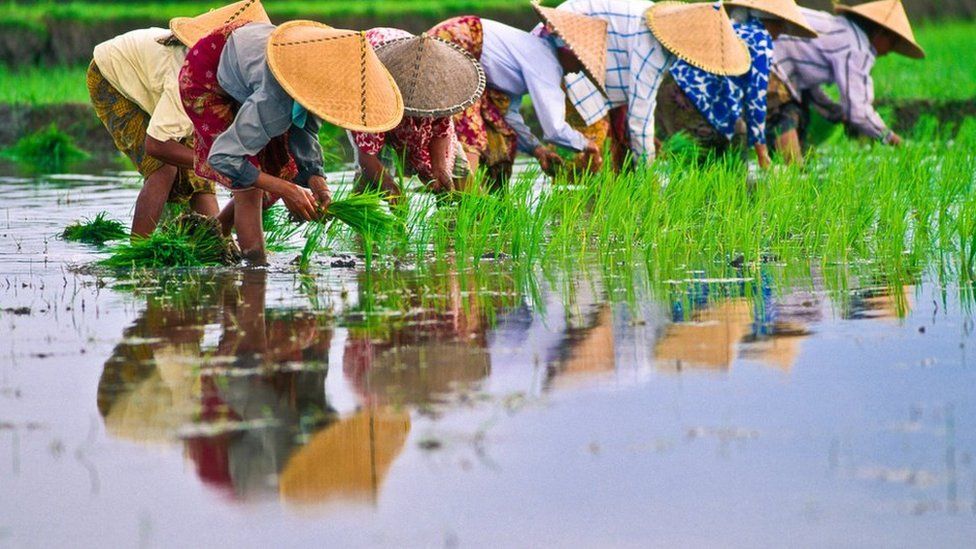 Getty Images
Getty ImagesIndonesia’s president has ordered the military to help farmers plant rice, as severe drought fuelled by the El Niño weather phenomenon threatens yields.
Joko Widodo told army officers to take advantage of recent rainfall in some provinces and help with the planting effort.
Prolonged drought has reduced output of the staple crop in South East Asia’s most populous country.
High prices have increased imports and threatened food security.
Months of dry weather have put cultivation of rice – usually carried out in October – behind schedule in Indonesia. The country’s output this year dropped to 30.9 million tonnes from 31.53 million tonnes a year ago.
On Wednesday, during a visit to Pekalongan regency in central Java, President Joko Widodo posted a video on the presidential YouTube channel urging the military to come forward and help farmers with the sowing.
The semi-aquatic rice seedlings need consistent irrigation during the growing season.
“Since rainfall has occurred on some provinces, we want to encourage farmers to start planting rice,” said Mr Widodo. Standing next to a newly-planted paddy field, the president added, “It has been delayed due to El Niño, but we want to immediately plant, plant, plant.”
El Niño typically causes hotter and drier weather in South East Asia, reducing output in major producing and consuming countries.
An army spokesman, Julius Widjojono, said many rice farms were lacking labour as young people flocked to cities to work in factories for better wages. Therefore even though some farmers have land, they’re short of manpower.
Mr Widjojono said his officers could assess the workforce needed for planting, while troops could be deployed from nearby military units.
Driven by El Niño and a recent ban on non-Basmati white rice exports by India, the world’s top supplier, global rice prices have risen by as much as 45%, hitting the highest level for 15 years.
Agriculture Minister Amran Sulaiman said the involvement of armed forces in the past had helped Indonesia to achieve food self-sufficiency. He said that their co-operation could help the country reduce rice imports.
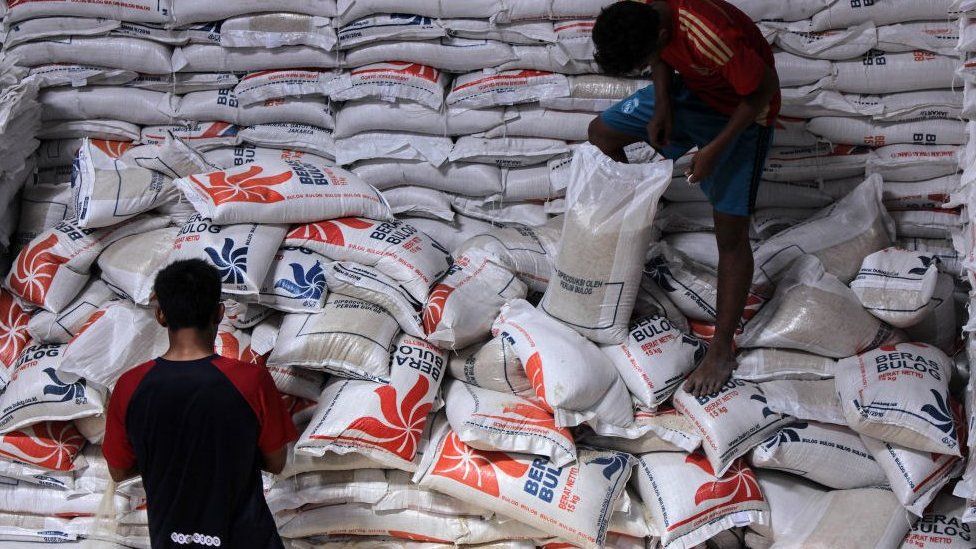
Earlier this month, the agriculture ministry and the Indonesian army signed an agreement that includes military personnel helping in farming and using idle army-owned land for rice plantation, with seedlings and machinery supplied by the ministry.
The state procurement company, Bulog, was assigned this year to import 3.5 million tonnes of rice – making Indonesia one of the top rice importers.
Related Topics
-
-
2 November 2015
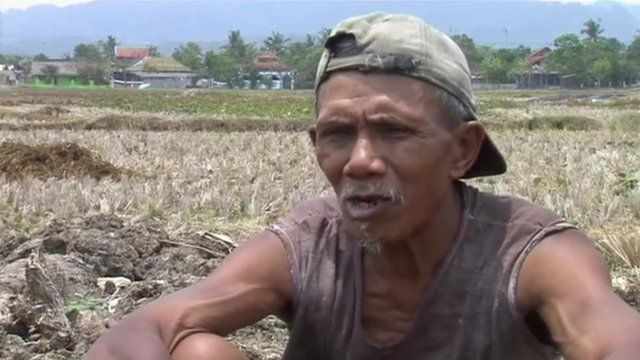
-
Temporary ceasefire agreed between junta, armed groups in north Myanmar: China
Beijing said on Thursday (Dec 14) it had mediated a temporary ceasefire in fighting between the Myanmar junta and ethnic minority armed groups in the north of the country close to the Chinese border. Recent talks between Myanmar’s military and the groups, facilitated by China, resulted in several agreements “includingContinue Reading
Hong Kong places arrest bounties on activists abroad for breaching national security law
Steven Li, chief superintendent of the police national security department, said the authorities received about 500 pieces of information since the last round of bounties were announced. While some of the information was valuable to the police, no arrest of the eight had yet been made. Li said the fiveContinue Reading
Retrenchments rise, labour demand continues to cool in third quarter of 2023: MOM
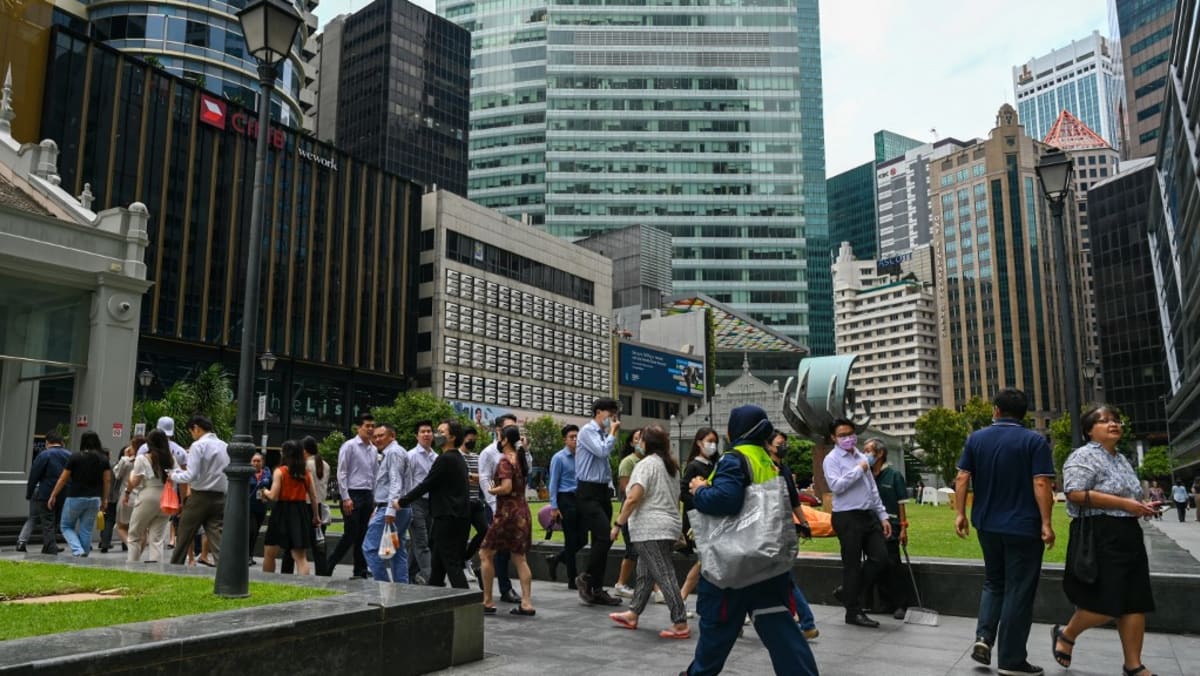
LABOUR DEMAND CONTINUES TO COOL
The number of job vacancies fell for the sixth consecutive quarter from a peak in March 2022.
Nearly one-third of all job vacancies in the third quarter were in growth sectors, including information and communications, health and social services, professional services, as well as financial and insurance services.
The labour market remained tight, with the overall number of job vacancies continuing to exceed the number of unemployed people.
The ratio of job vacancies to unemployed people was at 1.58 in September, down from 1.94 in June.
EMPLOYMENT
Total employment, excluding migrant domestic workers, rose by 23,600 in the third quarter, a smaller increase than the previous quarter. It was also the eighth consecutive quarter that total employment had increased.
Resident employment grew by 2,800 in the third quarter, a reversal of the contraction in the previous quarter. The increase was mainly in growth sectors, including health and social services, financial and insurance services, as well as professional services.
Non-resident employment continued to expand, although at a slower pace compared with previous quarters. This increase was mainly from several sectors, namely construction, administrative and support services and food and beverage services.
The construction sector has seen slowing growth since the third quarter of 2022, said MOM.
Unemployment rates remained low in October. The overall unemployment rate was 1.9 per cent, while the resident unemployment rate was 2.7 per cent and the citizen rate was 2.9 per cent.
MOM said the rise in resident long-term unemployment rate to the pre-COVID average rate “bears close monitoring”.
Resident long-term unemployment rate rose from the eight-year low of 0.5 per cent in June to 0.7 per cent in September.
“While the labour market continued to expand, the pace of employment growth has slowed compared to a year ago. Economic headwinds will continue to weigh on the labour market going forward,” said MOM.
“The government encourages employers and workers to make full use of available programmes to remain competitive and resilient amidst economic uncertainty.
“We encourage employers to press on with business transformation and equip their workers for expanded or redesigned job roles. Workers are encouraged to continue to upskill and be open to new opportunities.”
Philippines ‘wargaming’ Chinese hostilities as sea standoffs intensify
MANILA: The Philippines is contingency planning for an escalation of hostilities in the South China Sea, according to a senior military official, including a scenario where crew repel Chinese forces attempting to board Philippine vessels. Ties between the two countries have deteriorated this year after several collisions and repeated standoffsContinue Reading
Charter court to decide Saksayamâs fate on Jan 17
Bhumjaithai heavyweight accused of holding shares in construction firm that won government contracts
PUBLISHED : 14 Dec 2023 at 17:43

The Constitutional Court will decide the fate of former transport minister Saksayam Chidchob, who is accused of share concealment, next month.
The court said it would deliver its ruling on Jan 17, after hearing testimony on Thursday from Mr Saksayam and five other people.
Speaking after testifying, Mr Saksayam said he had already presented the facts about his shareholding in Burijarearn Construction Limited Partnership. He thanked the court for giving him the opportunity to clarify the allegations against him, saying he had fully explained the matter.
Aside from Mr Saksayam, the six-hour hearing featured testimony from Varaporn Thetsen, Supawat Kasemsut, Warangsiri Rakitti, Thitima Klaophimai and Anchalee Parudram.
The court on March 3 suspended Mr Saksayam, then transport minister in the previous coalition government led by Prayut Chan-o-cha, for alleged share concealment pending a ruling.
The court made the order after accepting a petition by a group of 54 opposition MPs against the Bhumjaithai Party MP and brother of Bhumjaithai patriarch Newin Chidchob. Construction has long been one of the main businesses of the Buri Ram-based Chidchob family.
According to the petition, Mr Saksayam used a nominee to hold shares in Burijarearn, which was awarded contracts worth billions of baht by his ministry.
The case was first raised during a no-confidence debate against the Prayut government in July last year. Opposition MPs accused Mr Saksayam of using an employee as a nominee to hold shares on his behalf. Section 187 of the constitution prohibits a minister from holding shares.
Mr Saksayam became a major shareholder of Burijarearn in 2015 when he increased the company’s registered capital to 120 million baht. The company was awarded construction projects worth 440 million baht between 2015 and 2017. Before the 2019 election, he transferred his shares worth 119.4 million baht to the nominee, according to the opposition.
Mr Saksayam disputed the allegations, saying a friend had bought the company’s shares and there was proof of the money transfer.
In July this year, the Move Forward Party provided new evidence which it claimed substantiated allegations that Mr Saksayam concealed assets belonging to his family’s company.
Pakornwut Udompipatskul, a Move Forward MP, said an annual financial report issued by Burijarearn showed Mr Saksayam had an outstanding liability with the company. This fact was concealed before he became an MP and assumed the post of transport minister, and he failed to declare it to the National-Anti Corruption Commission (NACC).
Mr Pakornwut was one of 54 politicians who signed the petition against Mr Saksayam.



